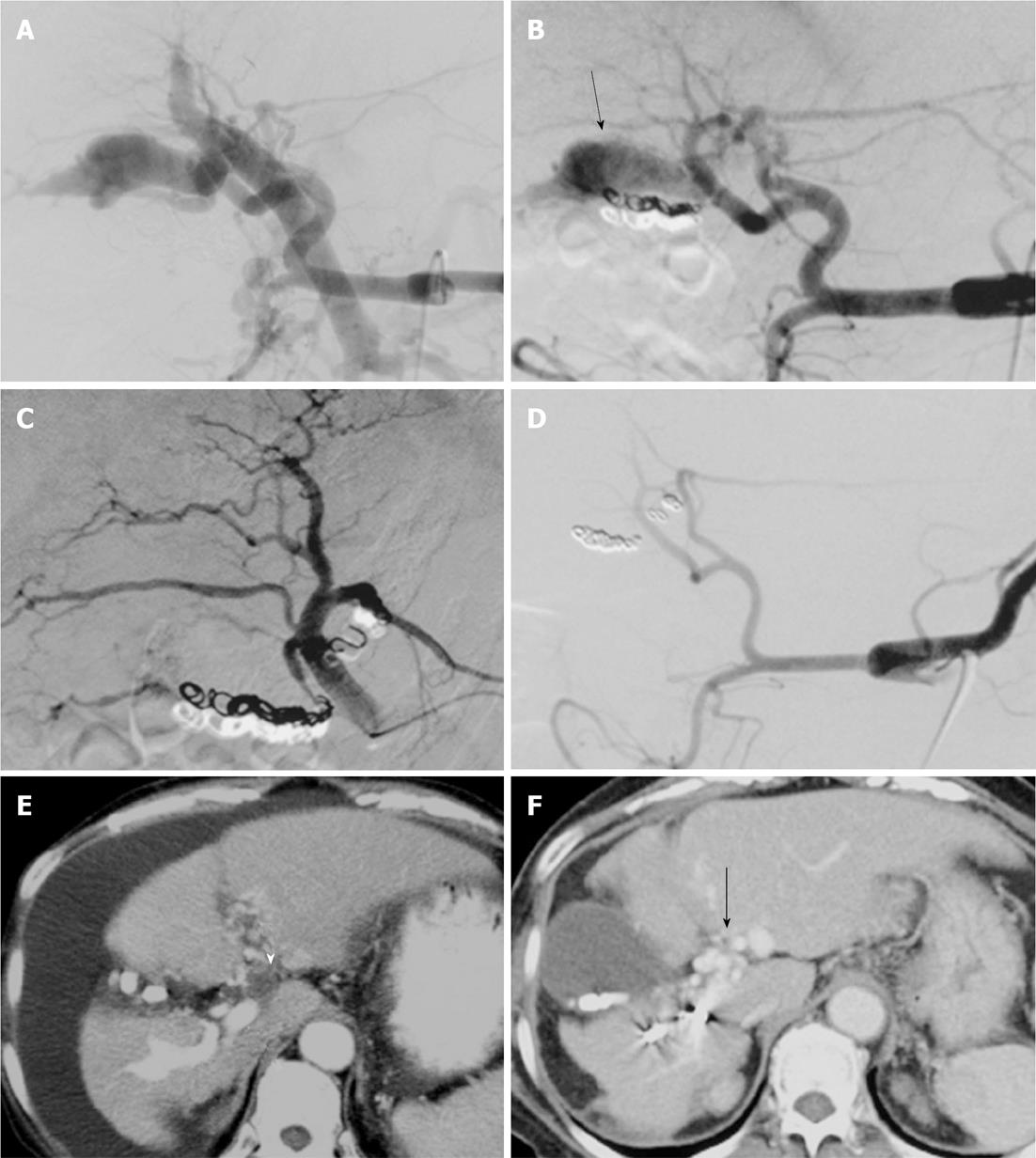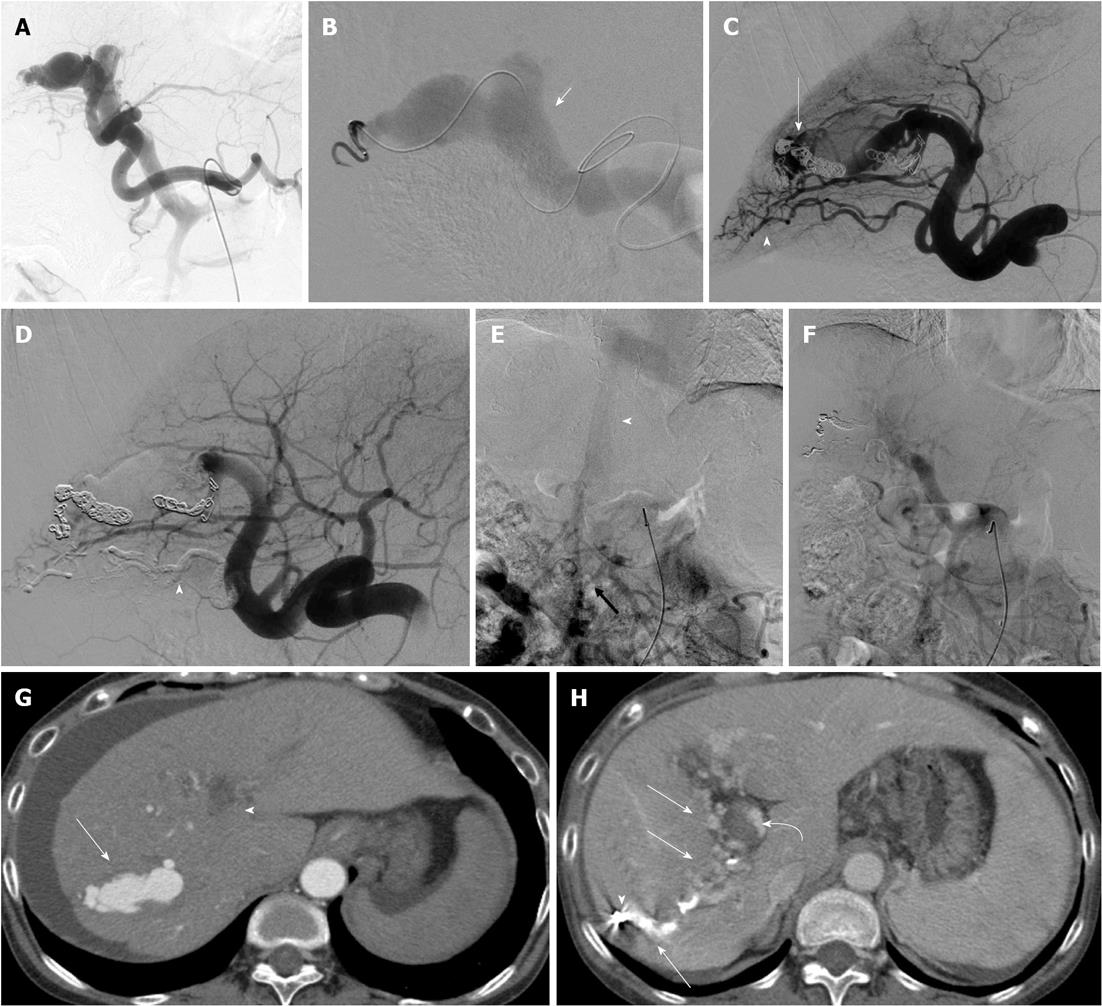Copyright
©2013 Baishideng Publishing Group Co.
Figure 1 Case 2: A 60-year-old woman with arterioportal fistula and refractory ascites related to liver biopsy performed 5 years earlier.
A: Celiac arteriogram before transcatheter arterial embolization (TAE) shows enlarged, tortuous hepatic artery and immediate retrograde visualization of main portal vein (PV) trunk. Note branches of the right hepatic artery (A7 and A8) supplying the fistulous connection to the right PV branch. A7 was superselectively embolized using microcoils; B: Celiac arteriogram 10 d after the initial TAE shows a peripheral branch of the right PV (arrow). Additional TAE for A6 was performed using microcoils; C: Right hepatic arteriogram after second TAE indicates obliteration of arterioportal fistula (APF); D: Follow-up celiac arteriogram 12 mo after TAE shows obliteration of APF and improved enlarged hepatic artery; E: Qualifying computed tomography (CT) (hepatic arterial phase image) before TAE. CT shows simultaneous enhancement of the aorta and right branch of PV (white arrow), indicating severe APF, PV thrombi in the umbilical portion (arrowhead) and moderate ascites; F: Follow-up CT (portal venous phase image) 50 mo after TAE. CT shows the obliteration of APF, the disappearance of ascites and cavernous transformation (arrow).
Figure 2 Case 6: A 60-year-old woman with arterioportal fistula and refractory ascites related to liver biopsy performed 6 years earlier.
A: Celiac arteriogram before transcatheter arterial embolization (TAE) shows enlarged, tortuous hepatic artery and immediate retrograde visualization of the main portal vein (PV). Note the right hepatic arteries (A7 and A6) supplying the fistulous connection to the right PV branch; B: Superselective hepatic arteriogram before TAE shows immediate retrograde visualization of the main PV trunk (arrow). The tip of the microcatheter was placed at the distal site of arterioportal fistula (APF) in A7. A7 was superselectively embolized using microcoils and interlocking detachable coils; C: Right hepatic arteriogram after TAE for the main feeding artery, A7, still shows retrograde flow of the right PV branch (arrow). An additional feeding artery from A6 was also detected (arrowhead). A6 was superselectively embolized using 0.5 mL of n-butyl-2-cyanoacrylate-lipiodol mixed with lipiodol at a 1:4 ratio (arrowhead); D: Right hepatic arteriogram after TAE illustrates complete obliteration of the APF; E: Superior mesenteric artery (SMA) portogram before TAE shows an extrahepatic portosystemic shunt (arrow) and inferior vena cava (arrowhead). The main PV trunk is not visualized; F: SMA portogram after TAE illustrates the main trunk and intrahepatic branches of PV. Note the disappearance of the extrahepatic portosystemic shunt; G: Computed tomography (CT) on admission (hepatic arterial phase) shows simultaneous enhancement of the aorta and the right branch of PV (arrow), demonstrating severe APF. Note prominent PV thrombi in the umbilical portion (arrowhead); H: CT 6 d after TAE (portal venous phase) shows deteriorated PV thrombi (curved arrow) and cavernous transformation (arrows) while ascites have decreased. Note microcoils and glue in the right hepatic arteries (arrowheads). Hepatopetal flow signal in the main PV without arterial pulsation was demonstrated on color-Doppler ultrasound (not shown).
- Citation: Hirakawa M, Nishie A, Asayama Y, Ishigami K, Ushijima Y, Fujita N, Honda H. Clinical outcomes of symptomatic arterioportal fistulas after transcatheter arterial embolization. World J Radiol 2013; 5(2): 33-40
- URL: https://www.wjgnet.com/1949-8470/full/v5/i2/33.htm
- DOI: https://dx.doi.org/10.4329/wjr.v5.i2.33










